|
Books Should Be Free Loyal Books Free Public Domain Audiobooks & eBook Downloads |
|
|
Books Should Be Free Loyal Books Free Public Domain Audiobooks & eBook Downloads |
|
Philosophy Books |
|---|
|
Book type:
Sort by:
View by:
|
By: Baron Paul Henri Thiry d'Holbach (1723-1789) | |
|---|---|
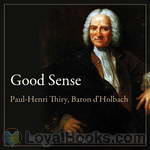 Good Sense
Good Sense
In 1770, Baron D'Holbach published his masterpiece, "Systeme de la Nature", which for a long time passed as the posthumous work of M. de Mirabaud. That text-book of "Atheistical Philosophy" caused a great sensation, and two years later, 1772, the Baron published this excellent abridgment of it, freed from arbitrary ideas; and by its clearness of expression, facility, and precision of style, rendered it most suitable for the average student. This text is based on an undated English translation of "Le Bon Sens" published c. 1900. The name of the translator was not stated. | |
By: Benedict de Spinoza (1632-1677) | |
|---|---|
 The Ethics
The Ethics
The Ethics is a philosophical book written by Baruch Spinoza. It was written in Latin. Although it was published posthumously in 1677, it is his most famous work, and is considered his magnum opus.In The Ethics, Spinoza attempts to demonstrate a "fully cohesive philosophical system that strives to provide a coherent picture of reality and to comprehend the meaning of an ethical life. Following a logical step-by-step format, it defines in turn the nature of God, the mind, human bondage to the emotions, and the power of understanding -- moving from a consideration of the eternal, to speculate upon humanity's place in the natural order, freedom, and the path to attainable happiness... | |
 Theologico-Political Treatise
Theologico-Political Treatise
Written by the Dutch philosopher Baruch Spinoza, the Tractatus Theologico-Politicus or Theologico-Political Treatise was one of the most controversial texts of the early modern period. It was a preemptive defense of Spinoza's later work, Ethics, published posthumously in 1677, for which he anticipated harsh criticism. In the treatise, Spinoza put forth his most systematic critique of Judaism, and all organized religion in general. Spinoza argued that theology and philosophy must be kept separate, particularly in the reading of scripture... | |
By: Bernard of Clairvaux (1090-1153) | |
|---|---|
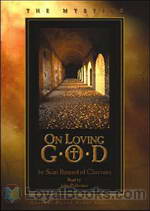 On Loving God
On Loving God
On Loving God is one of the best-known and most influential works of Medieval Christian mysticism. Written at the request of one of the cardinals of Rome, it describes the four “levels” of love for God, and puts Christian devotion in the context of God’s love for mankind. | |
By: Bertrand Russell (1872-1970) | |
|---|---|
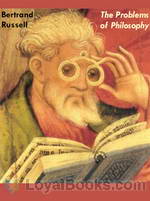 The Problems of Philosophy
The Problems of Philosophy
Published in 1912, The Problems of Philosophy by Bertrand Russell is one of his most popular books. It renders philosophical issues and questions in a way in which they become relevant and accessible to the man or woman on the street, provoking them to devote time and effort into thinking about these aspects of life. Here, the great philosopher and humanist thinker Bertrand Russell examines the importance of empirical (that which can be verified by observation or experience rather than deduced from logic or reasoning) thinkers like David Hume and George Berkeley the Anglo-Irish philosopher and scientist... | |
 Proposed Roads to Freedom
Proposed Roads to Freedom
Bertrand Russell, 3rd Earl Russell (1872 – 1970) was a British philosopher, logician, mathematician, political activist and Nobel laureate. He led the British “revolt against idealism” in the early 1900s and is considered one of the founders of analytic philosophy along with his predecessor Gottlob Frege and his protégé Ludwig Wittgenstein. In this book, written in 1918, he offers his assessment of three competing streams in the thought of the political left: Marxian socialism, anarchism and syndicalism. | |
 Mysticism and Logic and Other Essays
Mysticism and Logic and Other Essays
This anthology collects a number of fascinating strands of Bertrand Russell's thought. "Mathematics and the Metaphysicians" details the impact of the 1900 World Congress of Philosophers on Russell's development and the hope that new methods in mathematics could be applied to the solution of ancient philosophical problems. Many of the subsequent essays show the evolution of this hope as Russell worked on the foundations of mathematics and applied the new methods to the reconstruction of physical objects on the basis of sense-data, and the redefinition of matter and cause. | |
 Our Knowledge of the External World: As a Field for Scientific Method in Philosophy
Our Knowledge of the External World: As a Field for Scientific Method in Philosophy
Bertrand Russell gave the Lowell Lectures in March and April of 1914; these lectures produced 'Our Knowledge of the External World'. Russell attempts to analyze the relationship of the crude data of our senses to the notions of physics such as space, time, and matter. Russell takes his analysis to illustrate the method of logical analysis used to such wonderful effect by thinkers in the late nineteenth-century to the notions of continuity, infinity, and the infinitesimal. These analyses effected... | |
 Philosophy of Logical Atomism
Philosophy of Logical Atomism
'The Philosophy of Logical Atomism' is a series of lectures by Bertrand Russell (1872-1970) that touches on numerous topics, including the nature of propositions, the relations of propositions to facts and of different types of words to the varieties of things, what kinds of facts there are, existence, monism and pluralism, and aspects of philosophical logic and of reference. Guiding the lectures, at least according to Russell's headnote to his lectures, is Russell's intent to fully flesh out ideas he learned from his former pupil, Ludwig Wittgenstein (1889-1951). | |
 Introduction to Mathematical Philosophy
Introduction to Mathematical Philosophy
Bertrand Russell wrote 'Introduction to Mathematical Philosophy' while imprisoned for protesting Britain's involvement in World War I. Russell summarizes the significance of the momentous work of mathematicians in the late nineteenth-century. He further describes his own philosophy of mathematics, Logicism (the view that all mathematical truths are logical truths), and his earlier, influential work solving the paradoxes that plagued mathematical foundations, which crystallized after ten years of dogged effort into the co-authored (with Alfred North Whitehead), three-volume 'Principia Mathematica'... | |
By: Bhakti Seva | |
|---|---|
 The Hindu Book of Astrology
The Hindu Book of Astrology
Each person is born in or under one of the twelve signs of the Zodiac and is thus influenced throughout life by the planetary conditions at their time of birth. By referring to your sign, which is indicated by your date and month of birth you can determine your natural tendencies and what is best for you to attract. No matter what one of the twelve signs of the Zodiac you are born under, you can develop into a good and successful person if you will pay strict attention to the golden truths printed in this book. (Bhakti Seva) | |
By: Blaise Pascal | |
|---|---|
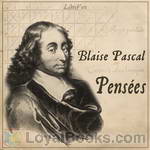 Pensées
Pensées
Pascal’s Pensées is widely considered to be a masterpiece, and a landmark in French prose. When commenting on one particular section (Thought #72), Sainte-Beuve praised it as the finest pages in the French language. Will Durant, in his 11-volume, comprehensive The Story of Civilization series, hailed it as “the most eloquent book in French prose.” In Pensées, Pascal surveys several philosophical paradoxes: infinity and nothing, faith and reason, soul and matter, death and life, meaning and vanity—seemingly arriving at no definitive conclusions besides humility, ignorance, and grace. Rolling these into one he develops Pascal’s Wager. | |
By: Bliss Perry (1860-1954) | |
|---|---|
 Fishing with a Worm
Fishing with a Worm
Fishing with a Worm by Bliss Perry includes the poignant and philisophical observations of a fly fisherman lured by the worm. Bliss Perry was a professor of literature at Princeton and Harvard Universities and spent time in Vermont writing and fly fishing. | |
By: Booker T. Washington (1856-1915) | |
|---|---|
 Character Building
Character Building
Character Building is a compilation of speeches, given by Mr. Booker T. Washington, to the students and staff of the Tuskegee Normal and Industrial Institute (now known as Tuskegee University).Booker T. Washington was one of the most prominent leaders in advancing African-American civil rights. Born into slavery and freed as a young boy, he rose through the ranks of education to eventually earn his position as principal of Tuskegee. Under his guidance, the school was built, by students and for students, to give them a deeply meaningful education... | |
By: Brontë sisters | |
|---|---|
 Selected Poems by Currer, Ellis and Acton Bell
Selected Poems by Currer, Ellis and Acton Bell
Poems by Currer, Ellis and Acton Bell was a volume of poetry published jointly by the three Bronte sisters, Charlotte, Emily and Anne in 1846, and their first work to ever go in print. To evade contemporary prejudice against female writers, the Bronte sisters adopted androgynous first names. Marked by profound sentiments, gravity and melodious harmony, the poems are strewn on the fields of soulful love, rueful reminiscence and the immortal yearnings of a Christian soul, and represent a fragrant assemblage of noetic flowers from the glebes of olden England... | |
By: BS Murthy | |
|---|---|
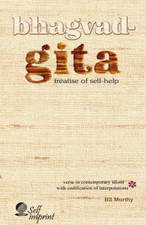 Bhagvad-Gita: Treatise of Self-help
Bhagvad-Gita: Treatise of Self-help
The spiritual ethos and the philosophical outlook that the Bhagvad - Gita postulates paves the way for the liberation of man, who, as Rousseau said, ‘being born free, is everywhere in chains’. But equally it is a mirror of human psychology, which enables man to discern his debilities for appropriate redressal. All the same, the boon of an oral tradition that kept it alive for over two millennia became its bane with the proliferation of interpolations therein. Besides muddying its pristine philosophy, these insertions affect the sequential conformity and structural economy of the grand discourse... | |
By: Camille Flammarion (1842-1925) | |
|---|---|
 Omega: The Last Days of the World
Omega: The Last Days of the World
Omega: The Last Days of the World is a science fiction novel by astronomer Camille Flammarion. On 25th century Earth, a comet is on a path to collide with the Earth ending it all. Astronomers predict different scenarios as to how they will all die depending on the chemical composition of the comet. Omega probes the philosophical and political consequences that arise as the human race faces the end of the world. | |
By: Carl von Clausewitz (1780-1831) | |
|---|---|
 On War
On War
A classic work on military strategy by a veteran of the Napoleonic Wars. The author's style is dialectical: he makes two strong but opposing statements and then draws them together to describe many facets of war. Free of technical jargon, and suitable for modern readers. This audiobook is based on a 1909 English translation. | |
By: Caroline Kane Mills Everett (1867-1921) | |
|---|---|
 Privilege of Pain
Privilege of Pain
We have seen that as mankind rises in the scale of civilization the body becomes increasingly less important. Nevertheless, I wish it to be clearly understood, that I do not maintain that it is preferable to be ill than well, but only that each state has its own peculiar privileges, which are rarely interchangeable. Health and sickness are merely different roads to achievement. The earth requires rain as well as sunshine; we need both tears and laughter; navvies are necessary and so are philosophers... | |
By: Charles Alexander Eastman (1858-1939) | |
|---|---|
 The Soul of the Indian
The Soul of the Indian
"We also have a religion which was given to our forefathers, and has been handed down to us their children. It teaches us to be thankful, to be united, and to love one another! We never quarrel about religion." | |
By: Charles Babbage (1791-1871) | |
|---|---|
 Passages from the Life of a Philosopher
Passages from the Life of a Philosopher
Some men write their lives to save themselves from ennui, careless of the amount they inflict on their readers. Others write their personal history, lest some kind friend should survive them, and, in showing off his own talent, unwittingly show them up. Others, again, write their own life from a different motive—from fear that the vampires of literature might make it their prey. I have frequently had applications to write my life, both from my countrymen and from foreigners. Some caterers for the public offered to pay me for it... | |
By: Charles Bradlaugh (1833-1891) | |
|---|---|
 Ancient and Modern Celebrated Freethinkers
Ancient and Modern Celebrated Freethinkers
| |
 Theological Essays
Theological Essays
Charles Bradlaugh was an English political activist and atheist who founded the National Secular Society in 1866. In the 23 "Theological Essays" collected here, he discusses his views on various topics such as whether man has a soul and if there is a God; who was Jesus Christ and the Apostles. He also deals in depth with various books of the Bible, gives an overview of the history of heresy, and tries to answer the question when the Gospels were written. | |
By: Charles F. Dole | |
|---|---|
 The Coming People
The Coming People
Dole briefly sketches the history of life, and shows how it has a definite direction - toward the survival of the kind and gentle people. It's a challenging, and quite persuasive argument, and also a much needed one in light of the dog-eat-dog theories out there. Dole shows that in our evolving society, our traditional understanding of "survival of the fittest" needs to be updated. A book that was way ahead of its time, yet so suited to it. Some may argue that - since he was writing The Coming People before the first two world wars - that he was obviously wrong... | |
By: Charles H. Spurgeon (1834-1892) | |
|---|---|
 All of Grace
All of Grace
HE WHO SPOKE and wrote this message will be greatly disappointed if it does not lead many to the Lord Jesus. It is sent forth in childlike dependence upon the power of God the Holy Ghost, to use it in the conversion of millions, if so He pleases. No doubt many poor men and women will take up this little volume, and the Lord will visit them with grace. To answer this end, the very plainest language has been chosen, and many homely expressions have been used. But if those of wealth and rank should glance at this book, the Holy Ghost can impress them also; since that which can be understood by the unlettered is none the less attractive to the instructed... | |
By: Charles W. Leadbeater (1854-1934) | |
|---|---|
 Vegetarianism and Occultism
Vegetarianism and Occultism
How does occultism regard vegetarianism? It regards it very favorably, and that for many reasons. These reasons may be divided into two classes: those which are ordinary and physical, and those which are occult or hidden. Let us see in detail why a vegetarian diet is emphatically the purest and the best. | |
By: Charlotte Perkins Gilman (1860-1935) | |
|---|---|
 Herland
Herland
Herland is a utopian novel from 1915, written by feminist Charlotte Perkins Gilman. The book describes an isolated society comprised entirely of Aryan women who reproduce via parthenogenesis (asexual reproduction). The result is an ideal social order, free of war, conflict and domination. It first appeared as a serial in Perkin’s monthly magazine Forerunner. | |
By: Christopher Marlowe (1564-1593) | |
|---|---|
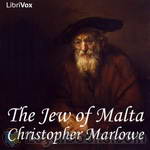 The Jew of Malta
The Jew of Malta
Christopher “Kit” Marlowe (baptised 26 February 1564 – 30 May 1593) was an English dramatist, poet, and translator of the Elizabethan era. The foremost Elizabethan tragedian before William Shakespeare, he is known for his magnificent blank verse, his overreaching protagonists, and his own untimely death. The Jew of Malta (1589) is an original story of religious conflict, intrigue, and revenge, set against a backdrop of the struggle for supremacy between Spain and the Ottoman Empire in the Mediterranean... | |
By: Clarence Darrow (1857-1938) | |
|---|---|
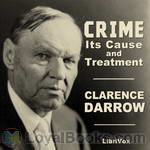 Crime: Its Cause and Treatment
Crime: Its Cause and Treatment
Clarence Darrow was an American lawyer. He remains notable for his wit and agnosticism, which marked him as one of the most famous American lawyers and civil libertarians.In this book, Darrow expands on his lifelong contention that psychological, physical, and environmental influences—not a conscious choice between right and wrong—control human behavior. To my ears (the reader's), the author has a rather simplistic behaviourist view of human behaviour, but he argues his position with wonderful clarity... | |
By: Confucius (551-479 BC) | |
|---|---|
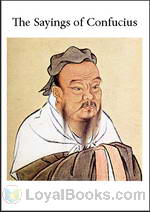 The Sayings of Confucius
The Sayings of Confucius
A treasure trove of wise and pithy sayings, reflections on education, family values, the ideal human being, life and living, politics, art, culture and timeless wisdom, The Sayings of Confucius is indeed an invaluable addition to your bookshelf. Ever since Chinese literary works first began to be translated into European languages, the works of the legendary Chinese philosopher and teacher Confucius, who lived in present day Qufu in the Shandong province of China, more than two thousand years ago, have held universal appeal... | |
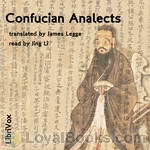 Confucian Analects
Confucian Analects
The Analects, or Lunyu (simplified Chinese: 论语; traditional Chinese: 論語; pinyin: Lún Yǔ; literally "Classified/Ordered Sayings"), also known as the Analects of Confucius, are considered a record of the words and acts of the central Chinese thinker and philosopher Confucius and his disciples, as well as the discussions they held. Written during the Spring and Autumn Period through the Warring States Period (ca. 475 BC - 221 BC), the Analects is the representative work of Confucianism and continues to have a substantial influence on Chinese and East Asian thought and values today... | |
By: D. H. Lawrence (1885-1930) | |
|---|---|
 The Prussian Officer and Other Stories
The Prussian Officer and Other Stories
The collection of short stories – of which The Prussian Officer is one – was Lawrence’s first such book. A German officer and his orderly are the focus of the piece and, while socially the superior of his orderly, the officer demonstrates his is the distinctly baser character. (Introduction by Cathy Barratt) | |